Internationalisation Strategies for Sainsbury's in Brazil Market
VerifiedAdded on 2023/06/10
|13
|4132
|191
AI Summary
This report discusses the pros and cons of The European Economic Community, rationales for multinational corporations to opt for internationalisation, how Sainsbury's can enter the international market in Brazil, and strategies for internationalisation.
Contribute Materials
Your contribution can guide someone’s learning journey. Share your
documents today.

Portfolio
Secure Best Marks with AI Grader
Need help grading? Try our AI Grader for instant feedback on your assignments.

Table of Contents
INTRODUCTION...........................................................................................................................3
MAIN BODY...................................................................................................................................3
Conduct online research on The European Economic Community along with their pros and
cons.............................................................................................................................................3
Discuss the rationales why multinational corporations opt for internationalisation ..................6
Analyse how can company enter the international market along with the introduction of
country.........................................................................................................................................7
Strategy of internationalisation ..................................................................................................8
Environmental analysis of the country.......................................................................................9
Modes of entry in international market.....................................................................................10
Leadership qualities that support market entry.........................................................................10
Recommendations.....................................................................................................................11
Individual reflective essay.........................................................................................................11
CONCLUSION..............................................................................................................................12
REFERENCES:.............................................................................................................................13
Books and Journals...................................................................................................................13
INTRODUCTION...........................................................................................................................3
MAIN BODY...................................................................................................................................3
Conduct online research on The European Economic Community along with their pros and
cons.............................................................................................................................................3
Discuss the rationales why multinational corporations opt for internationalisation ..................6
Analyse how can company enter the international market along with the introduction of
country.........................................................................................................................................7
Strategy of internationalisation ..................................................................................................8
Environmental analysis of the country.......................................................................................9
Modes of entry in international market.....................................................................................10
Leadership qualities that support market entry.........................................................................10
Recommendations.....................................................................................................................11
Individual reflective essay.........................................................................................................11
CONCLUSION..............................................................................................................................12
REFERENCES:.............................................................................................................................13
Books and Journals...................................................................................................................13
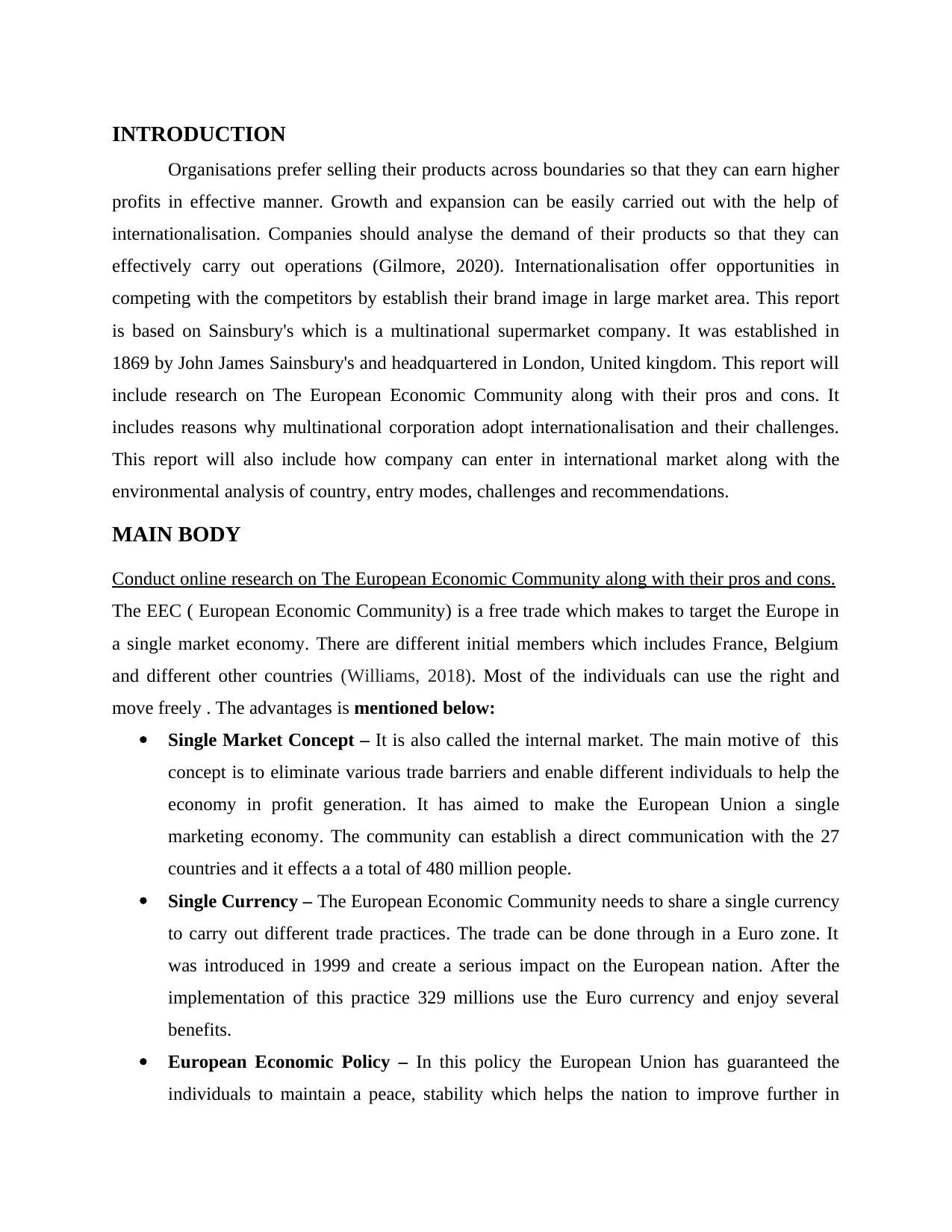
INTRODUCTION
Organisations prefer selling their products across boundaries so that they can earn higher
profits in effective manner. Growth and expansion can be easily carried out with the help of
internationalisation. Companies should analyse the demand of their products so that they can
effectively carry out operations (Gilmore, 2020). Internationalisation offer opportunities in
competing with the competitors by establish their brand image in large market area. This report
is based on Sainsbury's which is a multinational supermarket company. It was established in
1869 by John James Sainsbury's and headquartered in London, United kingdom. This report will
include research on The European Economic Community along with their pros and cons. It
includes reasons why multinational corporation adopt internationalisation and their challenges.
This report will also include how company can enter in international market along with the
environmental analysis of country, entry modes, challenges and recommendations.
MAIN BODY
Conduct online research on The European Economic Community along with their pros and cons.
The EEC ( European Economic Community) is a free trade which makes to target the Europe in
a single market economy. There are different initial members which includes France, Belgium
and different other countries (Williams, 2018). Most of the individuals can use the right and
move freely . The advantages is mentioned below:
Single Market Concept – It is also called the internal market. The main motive of this
concept is to eliminate various trade barriers and enable different individuals to help the
economy in profit generation. It has aimed to make the European Union a single
marketing economy. The community can establish a direct communication with the 27
countries and it effects a a total of 480 million people.
Single Currency – The European Economic Community needs to share a single currency
to carry out different trade practices. The trade can be done through in a Euro zone. It
was introduced in 1999 and create a serious impact on the European nation. After the
implementation of this practice 329 millions use the Euro currency and enjoy several
benefits.
European Economic Policy – In this policy the European Union has guaranteed the
individuals to maintain a peace, stability which helps the nation to improve further in
Organisations prefer selling their products across boundaries so that they can earn higher
profits in effective manner. Growth and expansion can be easily carried out with the help of
internationalisation. Companies should analyse the demand of their products so that they can
effectively carry out operations (Gilmore, 2020). Internationalisation offer opportunities in
competing with the competitors by establish their brand image in large market area. This report
is based on Sainsbury's which is a multinational supermarket company. It was established in
1869 by John James Sainsbury's and headquartered in London, United kingdom. This report will
include research on The European Economic Community along with their pros and cons. It
includes reasons why multinational corporation adopt internationalisation and their challenges.
This report will also include how company can enter in international market along with the
environmental analysis of country, entry modes, challenges and recommendations.
MAIN BODY
Conduct online research on The European Economic Community along with their pros and cons.
The EEC ( European Economic Community) is a free trade which makes to target the Europe in
a single market economy. There are different initial members which includes France, Belgium
and different other countries (Williams, 2018). Most of the individuals can use the right and
move freely . The advantages is mentioned below:
Single Market Concept – It is also called the internal market. The main motive of this
concept is to eliminate various trade barriers and enable different individuals to help the
economy in profit generation. It has aimed to make the European Union a single
marketing economy. The community can establish a direct communication with the 27
countries and it effects a a total of 480 million people.
Single Currency – The European Economic Community needs to share a single currency
to carry out different trade practices. The trade can be done through in a Euro zone. It
was introduced in 1999 and create a serious impact on the European nation. After the
implementation of this practice 329 millions use the Euro currency and enjoy several
benefits.
European Economic Policy – In this policy the European Union has guaranteed the
individuals to maintain a peace, stability which helps the nation to improve further in

their practices. The main driving force is the trade practices is commenced in the dingle
economy. This policy is contributing to the state in an effective manner.
Free MovemeThe EEC ( European Economic Community) is a free trade which
makes to target the Europe in a single market economy. There are different initial
members which includes France, Belgium and different other countries (Williams,
2018). Most of the individuals can use the right and move freely . The advantages is
mentioned below:
Single Market Concept – It is also called the internal market. The main motive of this
concept is to eliminate various trade barriers and enable different individuals to help the
economy in profit generation. It has aimed to make the European Union a single
marketing economy. The community can establish a direct communication with the 27
countries and it effects a a total of 480 million people.
Single Currency – The European Economic Community needs to share a single currency
to carry out different trade practices. The trade can be done through in a Euro zone. It
was introduced in 1999 and create a serious impact on the European nation. After the
implementation of this practice 329 millions use the Euro currency and enjoy several
benefits.
European Economic Policy – In this policy the European Union has guaranteed the
individuals to maintain a peace, stability which helps the nation to improve further in
their practices. The main driving force is the trade practices is commenced in the dingle
economy. This policy is contributing to the state in an effective manner.
Free Movement of People – In accordance to the Article 17(1) the individuals which
holds the nationality of the Europe and basically are citizens of the country had several
benefits. Under Article 18(1) the person of the nation can move freely and had the right
to move. They can take various decisions which could helps them to attain success in the
future. There are different participating countries which had generally established this
concept of free movement. This is one of the most important benefit of EEC.
The disadvantages of EEC is described below:
Problems with the Policies - Single market has resulted in arises on different problems.
There are various regulations which is designed to protect smaller countries. On the other
hand, it also affect the large countries. European commission makes different rules and
economy. This policy is contributing to the state in an effective manner.
Free MovemeThe EEC ( European Economic Community) is a free trade which
makes to target the Europe in a single market economy. There are different initial
members which includes France, Belgium and different other countries (Williams,
2018). Most of the individuals can use the right and move freely . The advantages is
mentioned below:
Single Market Concept – It is also called the internal market. The main motive of this
concept is to eliminate various trade barriers and enable different individuals to help the
economy in profit generation. It has aimed to make the European Union a single
marketing economy. The community can establish a direct communication with the 27
countries and it effects a a total of 480 million people.
Single Currency – The European Economic Community needs to share a single currency
to carry out different trade practices. The trade can be done through in a Euro zone. It
was introduced in 1999 and create a serious impact on the European nation. After the
implementation of this practice 329 millions use the Euro currency and enjoy several
benefits.
European Economic Policy – In this policy the European Union has guaranteed the
individuals to maintain a peace, stability which helps the nation to improve further in
their practices. The main driving force is the trade practices is commenced in the dingle
economy. This policy is contributing to the state in an effective manner.
Free Movement of People – In accordance to the Article 17(1) the individuals which
holds the nationality of the Europe and basically are citizens of the country had several
benefits. Under Article 18(1) the person of the nation can move freely and had the right
to move. They can take various decisions which could helps them to attain success in the
future. There are different participating countries which had generally established this
concept of free movement. This is one of the most important benefit of EEC.
The disadvantages of EEC is described below:
Problems with the Policies - Single market has resulted in arises on different problems.
There are various regulations which is designed to protect smaller countries. On the other
hand, it also affect the large countries. European commission makes different rules and
Secure Best Marks with AI Grader
Need help grading? Try our AI Grader for instant feedback on your assignments.

regulations for the EU (Blok, and Balk,2020). They take necessary interests in the entire
EU.
Problems with the Single currency – EU does not authorities the individuals to convert
their money. They are more emphasising on using the single currency. This has created
different problems and unemployment is at its peak. There are various decisions which
needs to be taken effectively in order to achieve a sustainable growth.
Overcrowding due to the immigration – The members of the states which are living are
able to relocate freely. In the next decade the overcrowding is the major factor which has
created different problems. &) million of the individuals had restricted to move freely.
This is creating a negative impact on the economy. With the coming period of time the
population is increasing in the European states. nt of People – In accordance to the
Article 17(1) the individuals which holds the nationality of the Europe and basically are
citizens of the country had several benefits. Under Article 18(1) the person of the nation
can move freely and had the right to move. They can take various decisions which could
helps them to attain success in the future. There are different participating countries
which had generally established this concept of free movement. This is one of the most
important benefit of EEC.
The disadvantages of EEC is described below:
Problems with the Policies - Single market has resulted in arises on different problems.
There are various regulations which is designed to protect smaller countries. On the other
hand, it also affect the large countries. European commission makes different rules and
regulations for the EU (Blok, and Balk,2020). They take necessary interests in the entire
EU.
Problems with the Single currency – EU does not authorities the individuals to convert
their money. They are more emphasising on using the single currency. This has created
different problems and unemployment is at its peak. There are various decisions which
needs to be taken effectively in order to achieve a sustainable growth.
Overcrowding due to the immigration – The members of the states which are living are
able to relocate freely. In the next decade the overcrowding is the major factor which has
created different problems. &) million of the individuals had restricted to move freely.
EU.
Problems with the Single currency – EU does not authorities the individuals to convert
their money. They are more emphasising on using the single currency. This has created
different problems and unemployment is at its peak. There are various decisions which
needs to be taken effectively in order to achieve a sustainable growth.
Overcrowding due to the immigration – The members of the states which are living are
able to relocate freely. In the next decade the overcrowding is the major factor which has
created different problems. &) million of the individuals had restricted to move freely.
This is creating a negative impact on the economy. With the coming period of time the
population is increasing in the European states. nt of People – In accordance to the
Article 17(1) the individuals which holds the nationality of the Europe and basically are
citizens of the country had several benefits. Under Article 18(1) the person of the nation
can move freely and had the right to move. They can take various decisions which could
helps them to attain success in the future. There are different participating countries
which had generally established this concept of free movement. This is one of the most
important benefit of EEC.
The disadvantages of EEC is described below:
Problems with the Policies - Single market has resulted in arises on different problems.
There are various regulations which is designed to protect smaller countries. On the other
hand, it also affect the large countries. European commission makes different rules and
regulations for the EU (Blok, and Balk,2020). They take necessary interests in the entire
EU.
Problems with the Single currency – EU does not authorities the individuals to convert
their money. They are more emphasising on using the single currency. This has created
different problems and unemployment is at its peak. There are various decisions which
needs to be taken effectively in order to achieve a sustainable growth.
Overcrowding due to the immigration – The members of the states which are living are
able to relocate freely. In the next decade the overcrowding is the major factor which has
created different problems. &) million of the individuals had restricted to move freely.
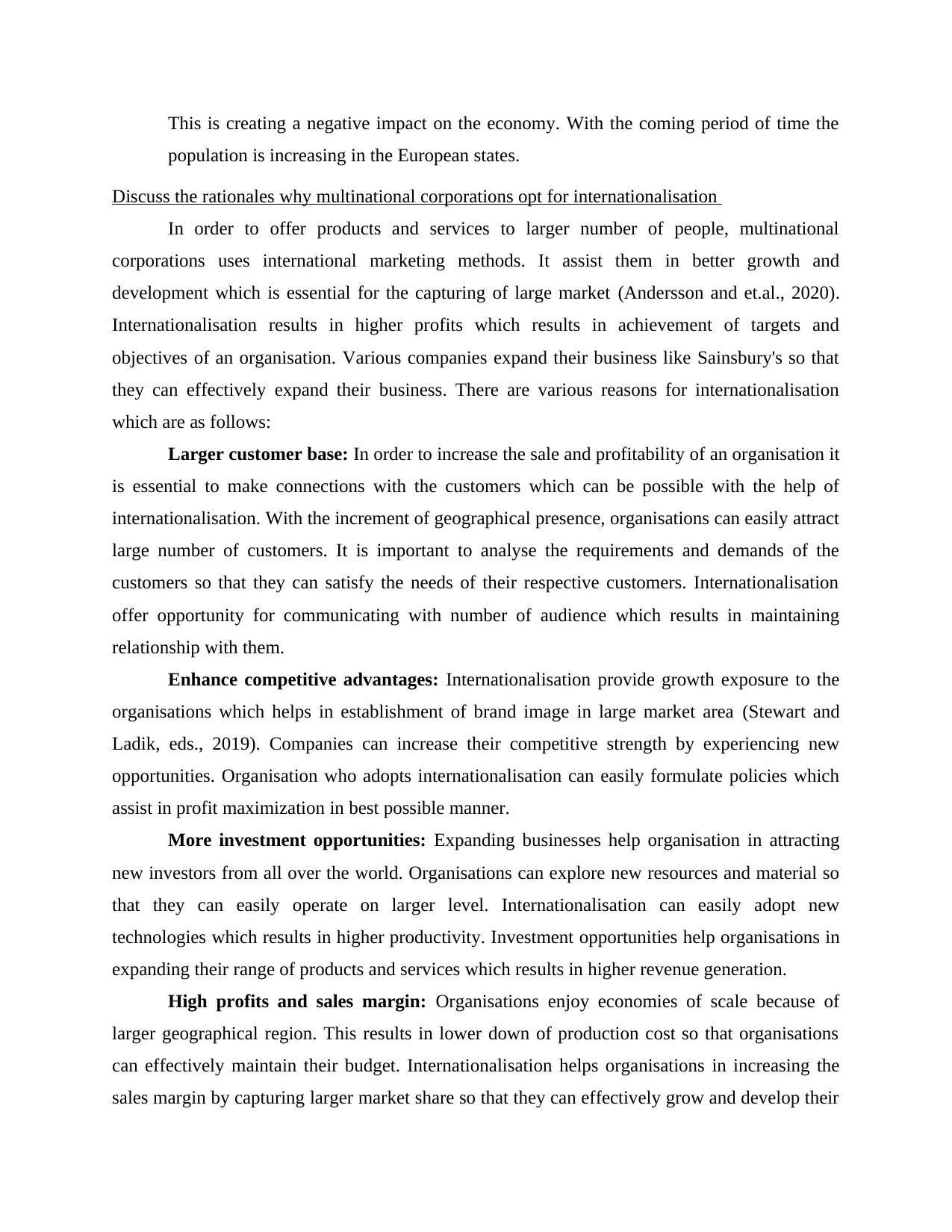
This is creating a negative impact on the economy. With the coming period of time the
population is increasing in the European states.
Discuss the rationales why multinational corporations opt for internationalisation
In order to offer products and services to larger number of people, multinational
corporations uses international marketing methods. It assist them in better growth and
development which is essential for the capturing of large market (Andersson and et.al., 2020).
Internationalisation results in higher profits which results in achievement of targets and
objectives of an organisation. Various companies expand their business like Sainsbury's so that
they can effectively expand their business. There are various reasons for internationalisation
which are as follows:
Larger customer base: In order to increase the sale and profitability of an organisation it
is essential to make connections with the customers which can be possible with the help of
internationalisation. With the increment of geographical presence, organisations can easily attract
large number of customers. It is important to analyse the requirements and demands of the
customers so that they can satisfy the needs of their respective customers. Internationalisation
offer opportunity for communicating with number of audience which results in maintaining
relationship with them.
Enhance competitive advantages: Internationalisation provide growth exposure to the
organisations which helps in establishment of brand image in large market area (Stewart and
Ladik, eds., 2019). Companies can increase their competitive strength by experiencing new
opportunities. Organisation who adopts internationalisation can easily formulate policies which
assist in profit maximization in best possible manner.
More investment opportunities: Expanding businesses help organisation in attracting
new investors from all over the world. Organisations can explore new resources and material so
that they can easily operate on larger level. Internationalisation can easily adopt new
technologies which results in higher productivity. Investment opportunities help organisations in
expanding their range of products and services which results in higher revenue generation.
High profits and sales margin: Organisations enjoy economies of scale because of
larger geographical region. This results in lower down of production cost so that organisations
can effectively maintain their budget. Internationalisation helps organisations in increasing the
sales margin by capturing larger market share so that they can effectively grow and develop their
population is increasing in the European states.
Discuss the rationales why multinational corporations opt for internationalisation
In order to offer products and services to larger number of people, multinational
corporations uses international marketing methods. It assist them in better growth and
development which is essential for the capturing of large market (Andersson and et.al., 2020).
Internationalisation results in higher profits which results in achievement of targets and
objectives of an organisation. Various companies expand their business like Sainsbury's so that
they can effectively expand their business. There are various reasons for internationalisation
which are as follows:
Larger customer base: In order to increase the sale and profitability of an organisation it
is essential to make connections with the customers which can be possible with the help of
internationalisation. With the increment of geographical presence, organisations can easily attract
large number of customers. It is important to analyse the requirements and demands of the
customers so that they can satisfy the needs of their respective customers. Internationalisation
offer opportunity for communicating with number of audience which results in maintaining
relationship with them.
Enhance competitive advantages: Internationalisation provide growth exposure to the
organisations which helps in establishment of brand image in large market area (Stewart and
Ladik, eds., 2019). Companies can increase their competitive strength by experiencing new
opportunities. Organisation who adopts internationalisation can easily formulate policies which
assist in profit maximization in best possible manner.
More investment opportunities: Expanding businesses help organisation in attracting
new investors from all over the world. Organisations can explore new resources and material so
that they can easily operate on larger level. Internationalisation can easily adopt new
technologies which results in higher productivity. Investment opportunities help organisations in
expanding their range of products and services which results in higher revenue generation.
High profits and sales margin: Organisations enjoy economies of scale because of
larger geographical region. This results in lower down of production cost so that organisations
can effectively maintain their budget. Internationalisation helps organisations in increasing the
sales margin by capturing larger market share so that they can effectively grow and develop their
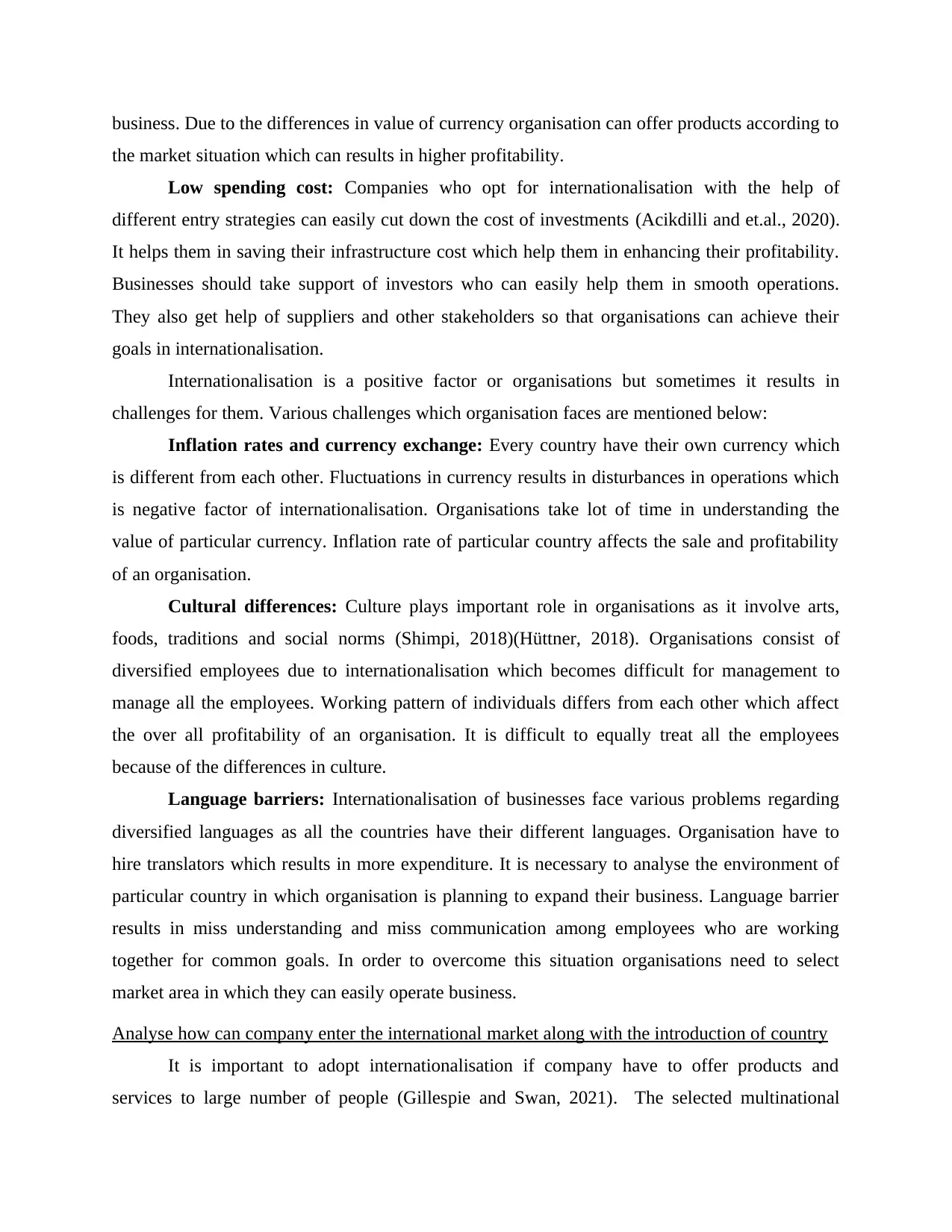
business. Due to the differences in value of currency organisation can offer products according to
the market situation which can results in higher profitability.
Low spending cost: Companies who opt for internationalisation with the help of
different entry strategies can easily cut down the cost of investments (Acikdilli and et.al., 2020).
It helps them in saving their infrastructure cost which help them in enhancing their profitability.
Businesses should take support of investors who can easily help them in smooth operations.
They also get help of suppliers and other stakeholders so that organisations can achieve their
goals in internationalisation.
Internationalisation is a positive factor or organisations but sometimes it results in
challenges for them. Various challenges which organisation faces are mentioned below:
Inflation rates and currency exchange: Every country have their own currency which
is different from each other. Fluctuations in currency results in disturbances in operations which
is negative factor of internationalisation. Organisations take lot of time in understanding the
value of particular currency. Inflation rate of particular country affects the sale and profitability
of an organisation.
Cultural differences: Culture plays important role in organisations as it involve arts,
foods, traditions and social norms (Shimpi, 2018)(Hüttner, 2018). Organisations consist of
diversified employees due to internationalisation which becomes difficult for management to
manage all the employees. Working pattern of individuals differs from each other which affect
the over all profitability of an organisation. It is difficult to equally treat all the employees
because of the differences in culture.
Language barriers: Internationalisation of businesses face various problems regarding
diversified languages as all the countries have their different languages. Organisation have to
hire translators which results in more expenditure. It is necessary to analyse the environment of
particular country in which organisation is planning to expand their business. Language barrier
results in miss understanding and miss communication among employees who are working
together for common goals. In order to overcome this situation organisations need to select
market area in which they can easily operate business.
Analyse how can company enter the international market along with the introduction of country
It is important to adopt internationalisation if company have to offer products and
services to large number of people (Gillespie and Swan, 2021). The selected multinational
the market situation which can results in higher profitability.
Low spending cost: Companies who opt for internationalisation with the help of
different entry strategies can easily cut down the cost of investments (Acikdilli and et.al., 2020).
It helps them in saving their infrastructure cost which help them in enhancing their profitability.
Businesses should take support of investors who can easily help them in smooth operations.
They also get help of suppliers and other stakeholders so that organisations can achieve their
goals in internationalisation.
Internationalisation is a positive factor or organisations but sometimes it results in
challenges for them. Various challenges which organisation faces are mentioned below:
Inflation rates and currency exchange: Every country have their own currency which
is different from each other. Fluctuations in currency results in disturbances in operations which
is negative factor of internationalisation. Organisations take lot of time in understanding the
value of particular currency. Inflation rate of particular country affects the sale and profitability
of an organisation.
Cultural differences: Culture plays important role in organisations as it involve arts,
foods, traditions and social norms (Shimpi, 2018)(Hüttner, 2018). Organisations consist of
diversified employees due to internationalisation which becomes difficult for management to
manage all the employees. Working pattern of individuals differs from each other which affect
the over all profitability of an organisation. It is difficult to equally treat all the employees
because of the differences in culture.
Language barriers: Internationalisation of businesses face various problems regarding
diversified languages as all the countries have their different languages. Organisation have to
hire translators which results in more expenditure. It is necessary to analyse the environment of
particular country in which organisation is planning to expand their business. Language barrier
results in miss understanding and miss communication among employees who are working
together for common goals. In order to overcome this situation organisations need to select
market area in which they can easily operate business.
Analyse how can company enter the international market along with the introduction of country
It is important to adopt internationalisation if company have to offer products and
services to large number of people (Gillespie and Swan, 2021). The selected multinational
Paraphrase This Document
Need a fresh take? Get an instant paraphrase of this document with our AI Paraphraser
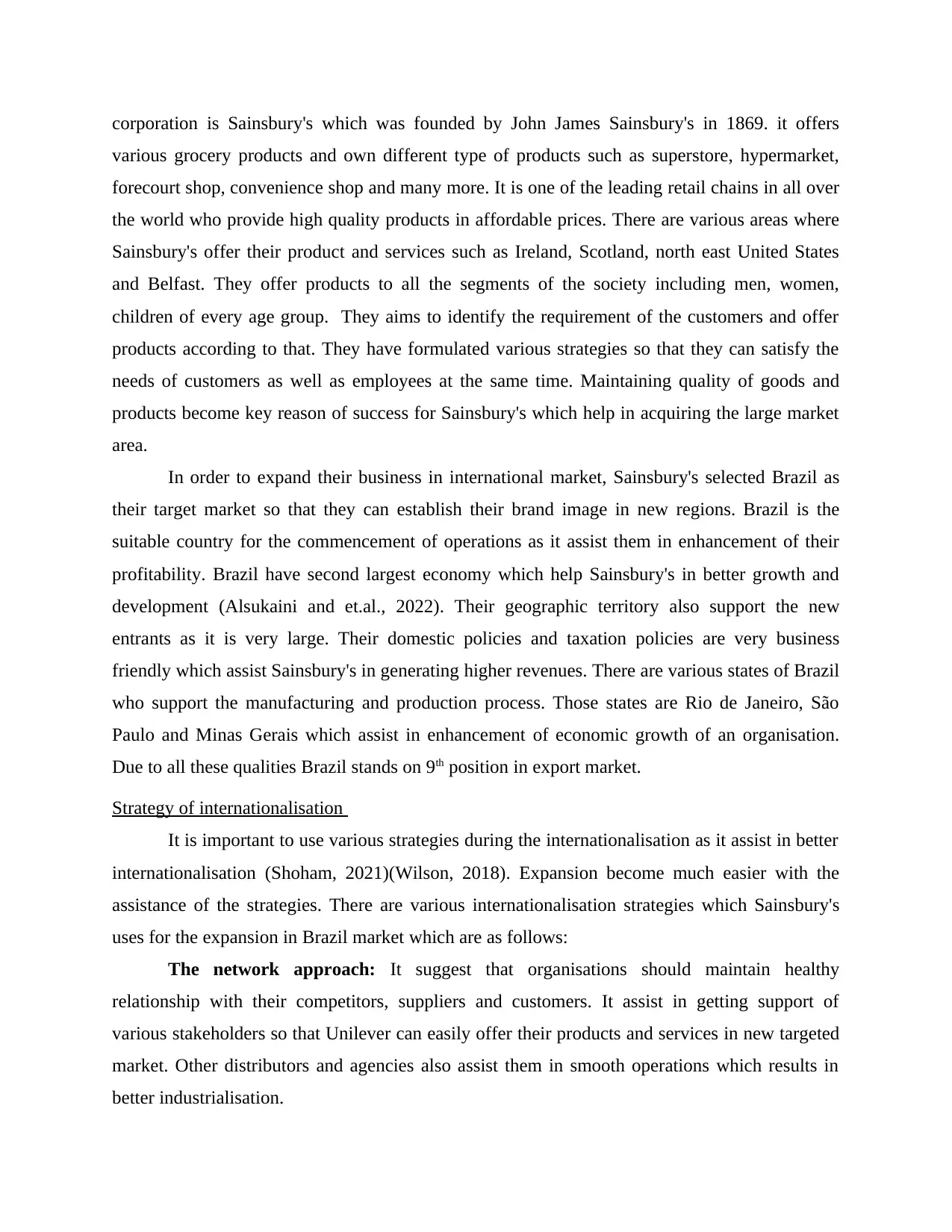
corporation is Sainsbury's which was founded by John James Sainsbury's in 1869. it offers
various grocery products and own different type of products such as superstore, hypermarket,
forecourt shop, convenience shop and many more. It is one of the leading retail chains in all over
the world who provide high quality products in affordable prices. There are various areas where
Sainsbury's offer their product and services such as Ireland, Scotland, north east United States
and Belfast. They offer products to all the segments of the society including men, women,
children of every age group. They aims to identify the requirement of the customers and offer
products according to that. They have formulated various strategies so that they can satisfy the
needs of customers as well as employees at the same time. Maintaining quality of goods and
products become key reason of success for Sainsbury's which help in acquiring the large market
area.
In order to expand their business in international market, Sainsbury's selected Brazil as
their target market so that they can establish their brand image in new regions. Brazil is the
suitable country for the commencement of operations as it assist them in enhancement of their
profitability. Brazil have second largest economy which help Sainsbury's in better growth and
development (Alsukaini and et.al., 2022). Their geographic territory also support the new
entrants as it is very large. Their domestic policies and taxation policies are very business
friendly which assist Sainsbury's in generating higher revenues. There are various states of Brazil
who support the manufacturing and production process. Those states are Rio de Janeiro, São
Paulo and Minas Gerais which assist in enhancement of economic growth of an organisation.
Due to all these qualities Brazil stands on 9th position in export market.
Strategy of internationalisation
It is important to use various strategies during the internationalisation as it assist in better
internationalisation (Shoham, 2021)(Wilson, 2018). Expansion become much easier with the
assistance of the strategies. There are various internationalisation strategies which Sainsbury's
uses for the expansion in Brazil market which are as follows:
The network approach: It suggest that organisations should maintain healthy
relationship with their competitors, suppliers and customers. It assist in getting support of
various stakeholders so that Unilever can easily offer their products and services in new targeted
market. Other distributors and agencies also assist them in smooth operations which results in
better industrialisation.
various grocery products and own different type of products such as superstore, hypermarket,
forecourt shop, convenience shop and many more. It is one of the leading retail chains in all over
the world who provide high quality products in affordable prices. There are various areas where
Sainsbury's offer their product and services such as Ireland, Scotland, north east United States
and Belfast. They offer products to all the segments of the society including men, women,
children of every age group. They aims to identify the requirement of the customers and offer
products according to that. They have formulated various strategies so that they can satisfy the
needs of customers as well as employees at the same time. Maintaining quality of goods and
products become key reason of success for Sainsbury's which help in acquiring the large market
area.
In order to expand their business in international market, Sainsbury's selected Brazil as
their target market so that they can establish their brand image in new regions. Brazil is the
suitable country for the commencement of operations as it assist them in enhancement of their
profitability. Brazil have second largest economy which help Sainsbury's in better growth and
development (Alsukaini and et.al., 2022). Their geographic territory also support the new
entrants as it is very large. Their domestic policies and taxation policies are very business
friendly which assist Sainsbury's in generating higher revenues. There are various states of Brazil
who support the manufacturing and production process. Those states are Rio de Janeiro, São
Paulo and Minas Gerais which assist in enhancement of economic growth of an organisation.
Due to all these qualities Brazil stands on 9th position in export market.
Strategy of internationalisation
It is important to use various strategies during the internationalisation as it assist in better
internationalisation (Shoham, 2021)(Wilson, 2018). Expansion become much easier with the
assistance of the strategies. There are various internationalisation strategies which Sainsbury's
uses for the expansion in Brazil market which are as follows:
The network approach: It suggest that organisations should maintain healthy
relationship with their competitors, suppliers and customers. It assist in getting support of
various stakeholders so that Unilever can easily offer their products and services in new targeted
market. Other distributors and agencies also assist them in smooth operations which results in
better industrialisation.

Process theory: Foreign market expansion can easily be done with the help this theory.
International operations help in finding new methods to commence operations in better manner
(Kaynak, 2021). It analyse various risk and threats so that Unilever can easily achieve their goals
and targets. A particular process should be adopted by an organisation so that they can maintain
quality of their products. It provides various alternatives to perform operations which are best
suitable according to the business in international targeted market.
Although these strategies are very helpful for organisations in order to expand their
business but it requires some changes and alterations according to the government and business
policies of the country. Unilever can use these strategies but at a limited extent because of the
diverse nature of Brazil. Some of the operations should be carried out according to the policies
and regulations of Brazil which can affect the profitability of Unilever both in negative and
positive manner.
Environmental analysis of the country
Before starting operations in international market it is important to analyse the business
environment of the targeted country which is Brazil. Unilever study various factors so that they
can formulate strategies and policies according to that. PESTLE analysis can be carried out as
follows:
Political factors: Businesses can easily carry out their operations in Brazil as they
possess political stability which is positive factor (Mamun, Strong and Azad, 2021). Unilever can
face some of the challenges due to the corruption but they formulate strict rules and regulations
which helps in overcoming them.
Economic factors: Growth potential of Brazil is very high which help Unilever in
increasing their profitability rate in effective manner. Risk of currency devaluation is also
decreased due to the government regulations.
Social factors: There can be seen equality in the popularity of Brazil which assist in the
increment of the profitability. The buying power of customers are high which help Unilever in
better growth and development.
Technological factors: It has been evaluated that technological advancement of Brazil is
comparatively low but they arrange technology with their neighbour countries. Gradually they
also developing various upgraded tools and techniques which help Unilever.
International operations help in finding new methods to commence operations in better manner
(Kaynak, 2021). It analyse various risk and threats so that Unilever can easily achieve their goals
and targets. A particular process should be adopted by an organisation so that they can maintain
quality of their products. It provides various alternatives to perform operations which are best
suitable according to the business in international targeted market.
Although these strategies are very helpful for organisations in order to expand their
business but it requires some changes and alterations according to the government and business
policies of the country. Unilever can use these strategies but at a limited extent because of the
diverse nature of Brazil. Some of the operations should be carried out according to the policies
and regulations of Brazil which can affect the profitability of Unilever both in negative and
positive manner.
Environmental analysis of the country
Before starting operations in international market it is important to analyse the business
environment of the targeted country which is Brazil. Unilever study various factors so that they
can formulate strategies and policies according to that. PESTLE analysis can be carried out as
follows:
Political factors: Businesses can easily carry out their operations in Brazil as they
possess political stability which is positive factor (Mamun, Strong and Azad, 2021). Unilever can
face some of the challenges due to the corruption but they formulate strict rules and regulations
which helps in overcoming them.
Economic factors: Growth potential of Brazil is very high which help Unilever in
increasing their profitability rate in effective manner. Risk of currency devaluation is also
decreased due to the government regulations.
Social factors: There can be seen equality in the popularity of Brazil which assist in the
increment of the profitability. The buying power of customers are high which help Unilever in
better growth and development.
Technological factors: It has been evaluated that technological advancement of Brazil is
comparatively low but they arrange technology with their neighbour countries. Gradually they
also developing various upgraded tools and techniques which help Unilever.
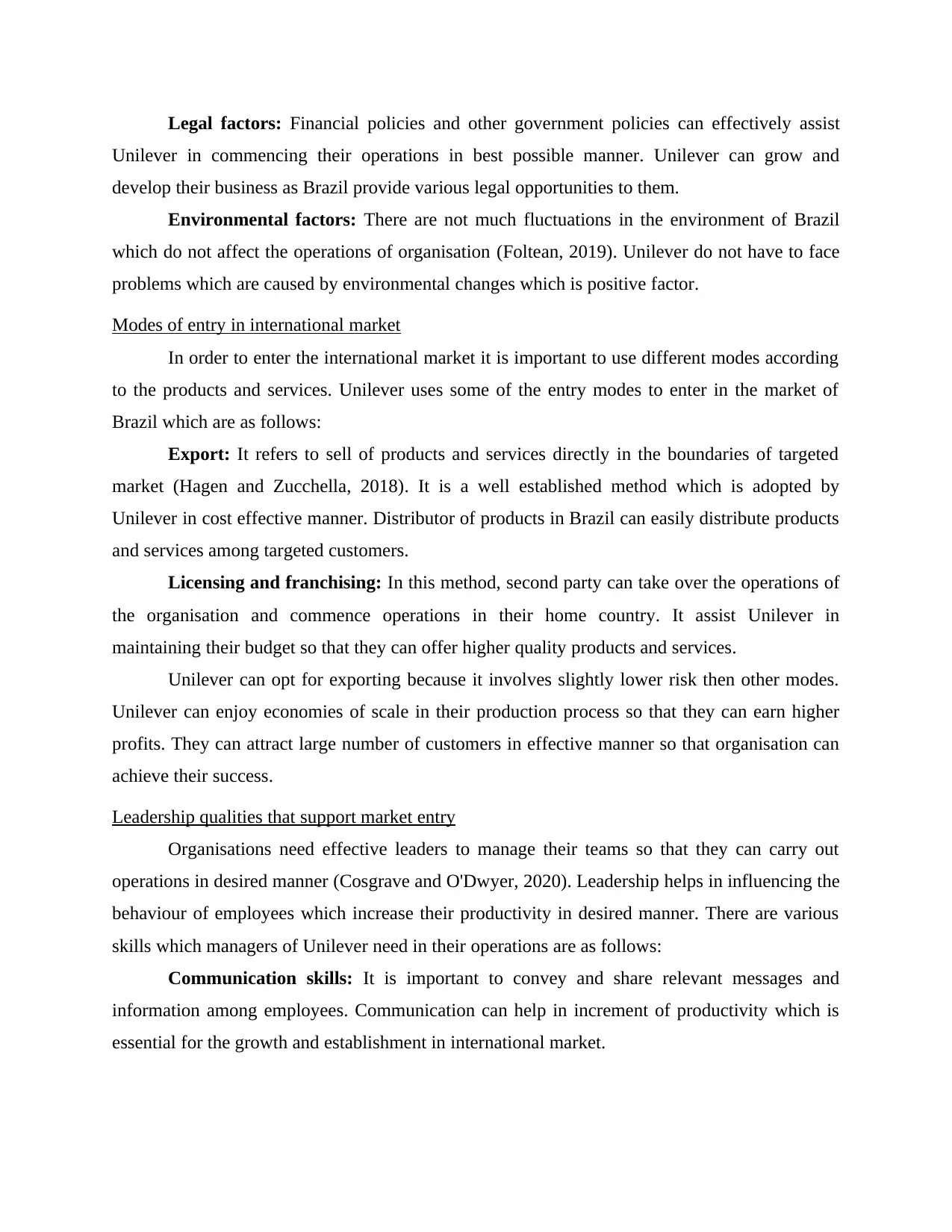
Legal factors: Financial policies and other government policies can effectively assist
Unilever in commencing their operations in best possible manner. Unilever can grow and
develop their business as Brazil provide various legal opportunities to them.
Environmental factors: There are not much fluctuations in the environment of Brazil
which do not affect the operations of organisation (Foltean, 2019). Unilever do not have to face
problems which are caused by environmental changes which is positive factor.
Modes of entry in international market
In order to enter the international market it is important to use different modes according
to the products and services. Unilever uses some of the entry modes to enter in the market of
Brazil which are as follows:
Export: It refers to sell of products and services directly in the boundaries of targeted
market (Hagen and Zucchella, 2018). It is a well established method which is adopted by
Unilever in cost effective manner. Distributor of products in Brazil can easily distribute products
and services among targeted customers.
Licensing and franchising: In this method, second party can take over the operations of
the organisation and commence operations in their home country. It assist Unilever in
maintaining their budget so that they can offer higher quality products and services.
Unilever can opt for exporting because it involves slightly lower risk then other modes.
Unilever can enjoy economies of scale in their production process so that they can earn higher
profits. They can attract large number of customers in effective manner so that organisation can
achieve their success.
Leadership qualities that support market entry
Organisations need effective leaders to manage their teams so that they can carry out
operations in desired manner (Cosgrave and O'Dwyer, 2020). Leadership helps in influencing the
behaviour of employees which increase their productivity in desired manner. There are various
skills which managers of Unilever need in their operations are as follows:
Communication skills: It is important to convey and share relevant messages and
information among employees. Communication can help in increment of productivity which is
essential for the growth and establishment in international market.
Unilever in commencing their operations in best possible manner. Unilever can grow and
develop their business as Brazil provide various legal opportunities to them.
Environmental factors: There are not much fluctuations in the environment of Brazil
which do not affect the operations of organisation (Foltean, 2019). Unilever do not have to face
problems which are caused by environmental changes which is positive factor.
Modes of entry in international market
In order to enter the international market it is important to use different modes according
to the products and services. Unilever uses some of the entry modes to enter in the market of
Brazil which are as follows:
Export: It refers to sell of products and services directly in the boundaries of targeted
market (Hagen and Zucchella, 2018). It is a well established method which is adopted by
Unilever in cost effective manner. Distributor of products in Brazil can easily distribute products
and services among targeted customers.
Licensing and franchising: In this method, second party can take over the operations of
the organisation and commence operations in their home country. It assist Unilever in
maintaining their budget so that they can offer higher quality products and services.
Unilever can opt for exporting because it involves slightly lower risk then other modes.
Unilever can enjoy economies of scale in their production process so that they can earn higher
profits. They can attract large number of customers in effective manner so that organisation can
achieve their success.
Leadership qualities that support market entry
Organisations need effective leaders to manage their teams so that they can carry out
operations in desired manner (Cosgrave and O'Dwyer, 2020). Leadership helps in influencing the
behaviour of employees which increase their productivity in desired manner. There are various
skills which managers of Unilever need in their operations are as follows:
Communication skills: It is important to convey and share relevant messages and
information among employees. Communication can help in increment of productivity which is
essential for the growth and establishment in international market.
Secure Best Marks with AI Grader
Need help grading? Try our AI Grader for instant feedback on your assignments.
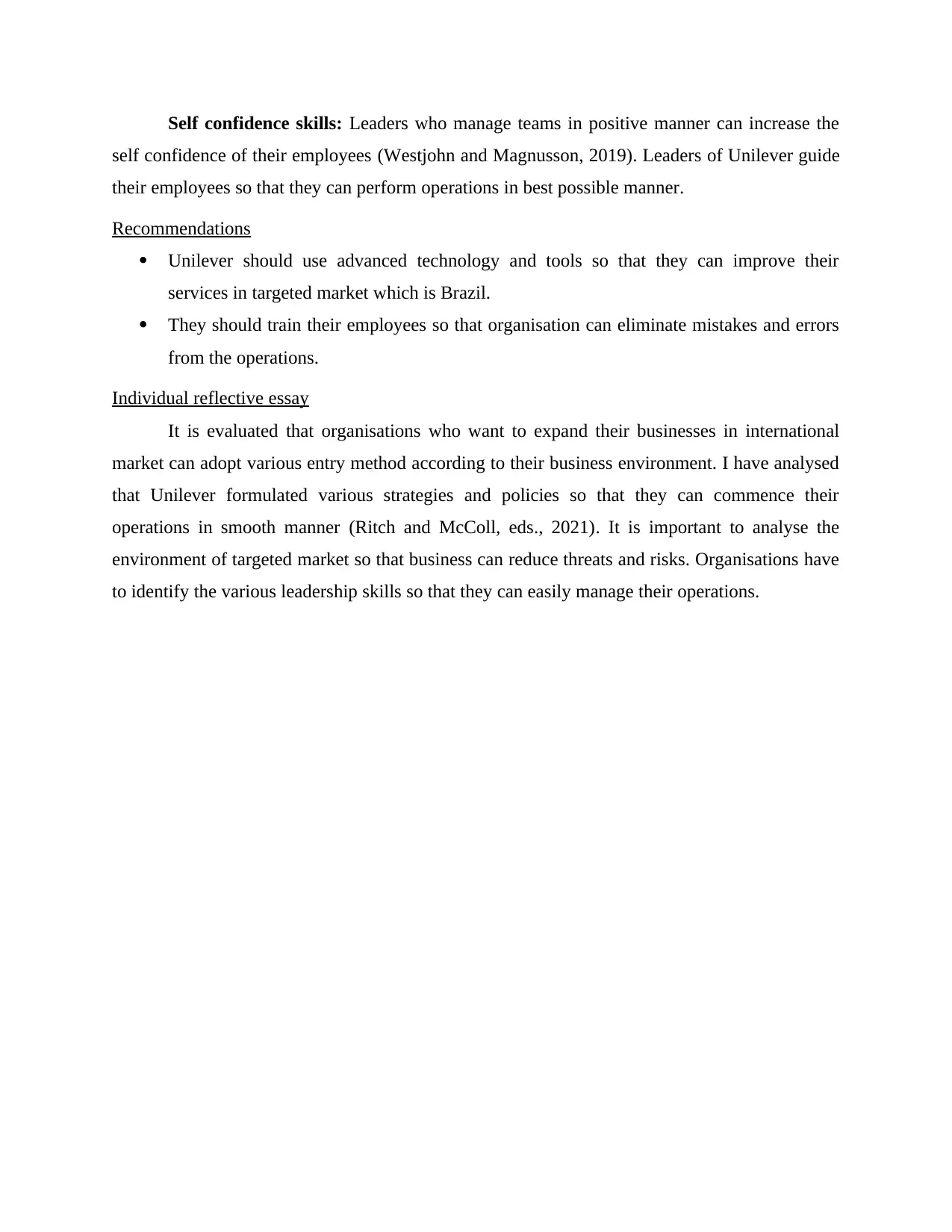
Self confidence skills: Leaders who manage teams in positive manner can increase the
self confidence of their employees (Westjohn and Magnusson, 2019). Leaders of Unilever guide
their employees so that they can perform operations in best possible manner.
Recommendations
Unilever should use advanced technology and tools so that they can improve their
services in targeted market which is Brazil.
They should train their employees so that organisation can eliminate mistakes and errors
from the operations.
Individual reflective essay
It is evaluated that organisations who want to expand their businesses in international
market can adopt various entry method according to their business environment. I have analysed
that Unilever formulated various strategies and policies so that they can commence their
operations in smooth manner (Ritch and McColl, eds., 2021). It is important to analyse the
environment of targeted market so that business can reduce threats and risks. Organisations have
to identify the various leadership skills so that they can easily manage their operations.
self confidence of their employees (Westjohn and Magnusson, 2019). Leaders of Unilever guide
their employees so that they can perform operations in best possible manner.
Recommendations
Unilever should use advanced technology and tools so that they can improve their
services in targeted market which is Brazil.
They should train their employees so that organisation can eliminate mistakes and errors
from the operations.
Individual reflective essay
It is evaluated that organisations who want to expand their businesses in international
market can adopt various entry method according to their business environment. I have analysed
that Unilever formulated various strategies and policies so that they can commence their
operations in smooth manner (Ritch and McColl, eds., 2021). It is important to analyse the
environment of targeted market so that business can reduce threats and risks. Organisations have
to identify the various leadership skills so that they can easily manage their operations.
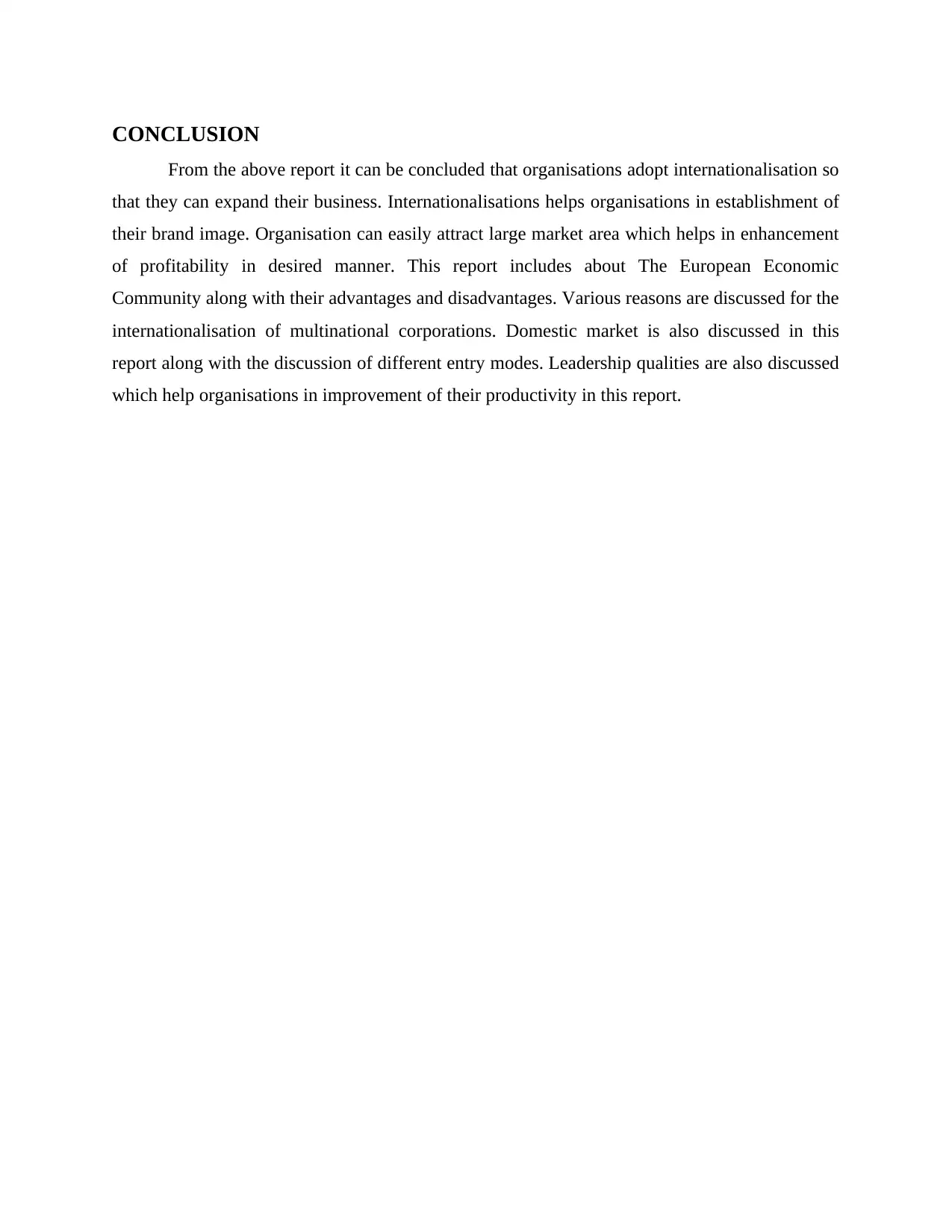
CONCLUSION
From the above report it can be concluded that organisations adopt internationalisation so
that they can expand their business. Internationalisations helps organisations in establishment of
their brand image. Organisation can easily attract large market area which helps in enhancement
of profitability in desired manner. This report includes about The European Economic
Community along with their advantages and disadvantages. Various reasons are discussed for the
internationalisation of multinational corporations. Domestic market is also discussed in this
report along with the discussion of different entry modes. Leadership qualities are also discussed
which help organisations in improvement of their productivity in this report.
From the above report it can be concluded that organisations adopt internationalisation so
that they can expand their business. Internationalisations helps organisations in establishment of
their brand image. Organisation can easily attract large market area which helps in enhancement
of profitability in desired manner. This report includes about The European Economic
Community along with their advantages and disadvantages. Various reasons are discussed for the
internationalisation of multinational corporations. Domestic market is also discussed in this
report along with the discussion of different entry modes. Leadership qualities are also discussed
which help organisations in improvement of their productivity in this report.
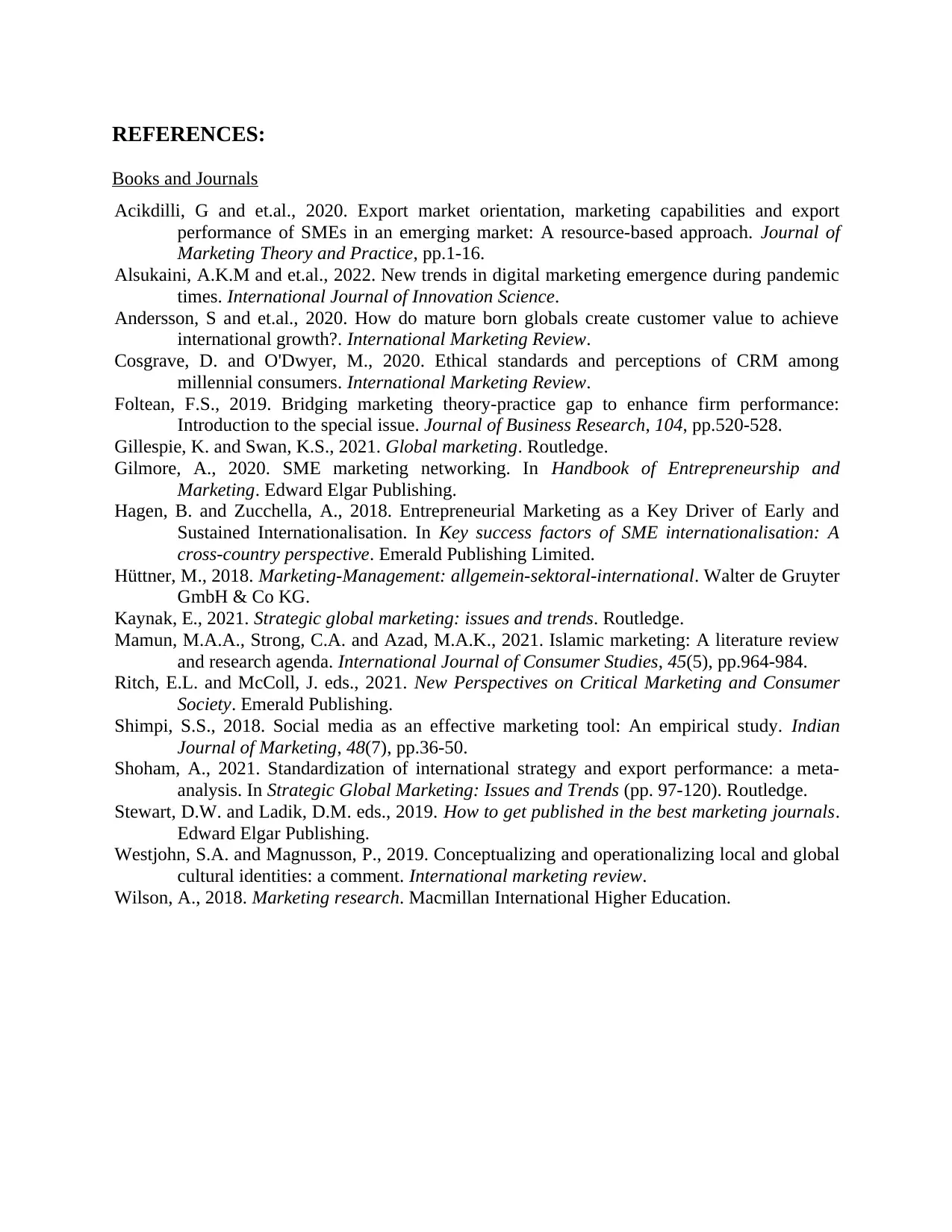
REFERENCES:
Books and Journals
Acikdilli, G and et.al., 2020. Export market orientation, marketing capabilities and export
performance of SMEs in an emerging market: A resource-based approach. Journal of
Marketing Theory and Practice, pp.1-16.
Alsukaini, A.K.M and et.al., 2022. New trends in digital marketing emergence during pandemic
times. International Journal of Innovation Science.
Andersson, S and et.al., 2020. How do mature born globals create customer value to achieve
international growth?. International Marketing Review.
Cosgrave, D. and O'Dwyer, M., 2020. Ethical standards and perceptions of CRM among
millennial consumers. International Marketing Review.
Foltean, F.S., 2019. Bridging marketing theory-practice gap to enhance firm performance:
Introduction to the special issue. Journal of Business Research, 104, pp.520-528.
Gillespie, K. and Swan, K.S., 2021. Global marketing. Routledge.
Gilmore, A., 2020. SME marketing networking. In Handbook of Entrepreneurship and
Marketing. Edward Elgar Publishing.
Hagen, B. and Zucchella, A., 2018. Entrepreneurial Marketing as a Key Driver of Early and
Sustained Internationalisation. In Key success factors of SME internationalisation: A
cross-country perspective. Emerald Publishing Limited.
Hüttner, M., 2018. Marketing-Management: allgemein-sektoral-international. Walter de Gruyter
GmbH & Co KG.
Kaynak, E., 2021. Strategic global marketing: issues and trends. Routledge.
Mamun, M.A.A., Strong, C.A. and Azad, M.A.K., 2021. Islamic marketing: A literature review
and research agenda. International Journal of Consumer Studies, 45(5), pp.964-984.
Ritch, E.L. and McColl, J. eds., 2021. New Perspectives on Critical Marketing and Consumer
Society. Emerald Publishing.
Shimpi, S.S., 2018. Social media as an effective marketing tool: An empirical study. Indian
Journal of Marketing, 48(7), pp.36-50.
Shoham, A., 2021. Standardization of international strategy and export performance: a meta-
analysis. In Strategic Global Marketing: Issues and Trends (pp. 97-120). Routledge.
Stewart, D.W. and Ladik, D.M. eds., 2019. How to get published in the best marketing journals.
Edward Elgar Publishing.
Westjohn, S.A. and Magnusson, P., 2019. Conceptualizing and operationalizing local and global
cultural identities: a comment. International marketing review.
Wilson, A., 2018. Marketing research. Macmillan International Higher Education.
Books and Journals
Acikdilli, G and et.al., 2020. Export market orientation, marketing capabilities and export
performance of SMEs in an emerging market: A resource-based approach. Journal of
Marketing Theory and Practice, pp.1-16.
Alsukaini, A.K.M and et.al., 2022. New trends in digital marketing emergence during pandemic
times. International Journal of Innovation Science.
Andersson, S and et.al., 2020. How do mature born globals create customer value to achieve
international growth?. International Marketing Review.
Cosgrave, D. and O'Dwyer, M., 2020. Ethical standards and perceptions of CRM among
millennial consumers. International Marketing Review.
Foltean, F.S., 2019. Bridging marketing theory-practice gap to enhance firm performance:
Introduction to the special issue. Journal of Business Research, 104, pp.520-528.
Gillespie, K. and Swan, K.S., 2021. Global marketing. Routledge.
Gilmore, A., 2020. SME marketing networking. In Handbook of Entrepreneurship and
Marketing. Edward Elgar Publishing.
Hagen, B. and Zucchella, A., 2018. Entrepreneurial Marketing as a Key Driver of Early and
Sustained Internationalisation. In Key success factors of SME internationalisation: A
cross-country perspective. Emerald Publishing Limited.
Hüttner, M., 2018. Marketing-Management: allgemein-sektoral-international. Walter de Gruyter
GmbH & Co KG.
Kaynak, E., 2021. Strategic global marketing: issues and trends. Routledge.
Mamun, M.A.A., Strong, C.A. and Azad, M.A.K., 2021. Islamic marketing: A literature review
and research agenda. International Journal of Consumer Studies, 45(5), pp.964-984.
Ritch, E.L. and McColl, J. eds., 2021. New Perspectives on Critical Marketing and Consumer
Society. Emerald Publishing.
Shimpi, S.S., 2018. Social media as an effective marketing tool: An empirical study. Indian
Journal of Marketing, 48(7), pp.36-50.
Shoham, A., 2021. Standardization of international strategy and export performance: a meta-
analysis. In Strategic Global Marketing: Issues and Trends (pp. 97-120). Routledge.
Stewart, D.W. and Ladik, D.M. eds., 2019. How to get published in the best marketing journals.
Edward Elgar Publishing.
Westjohn, S.A. and Magnusson, P., 2019. Conceptualizing and operationalizing local and global
cultural identities: a comment. International marketing review.
Wilson, A., 2018. Marketing research. Macmillan International Higher Education.
1 out of 13
Related Documents
Your All-in-One AI-Powered Toolkit for Academic Success.
+13062052269
info@desklib.com
Available 24*7 on WhatsApp / Email
![[object Object]](/_next/static/media/star-bottom.7253800d.svg)
Unlock your academic potential
© 2024 | Zucol Services PVT LTD | All rights reserved.




